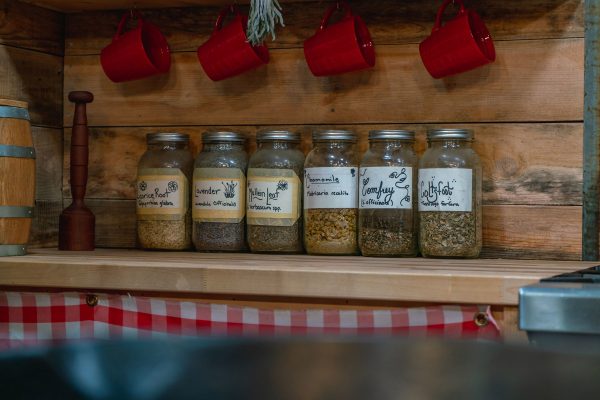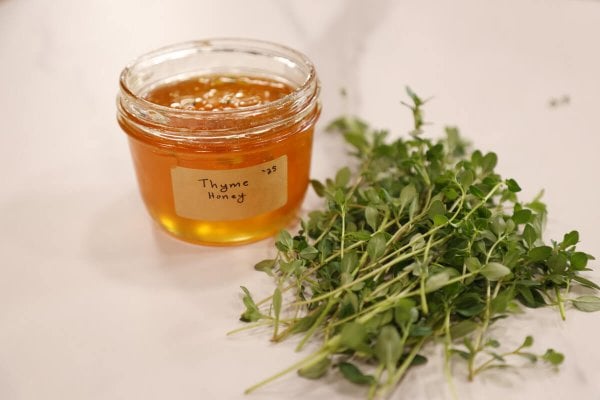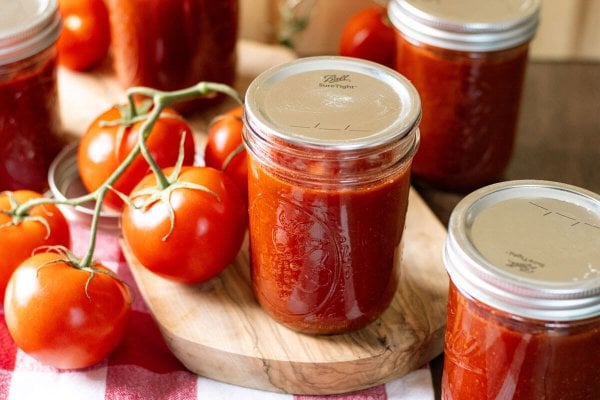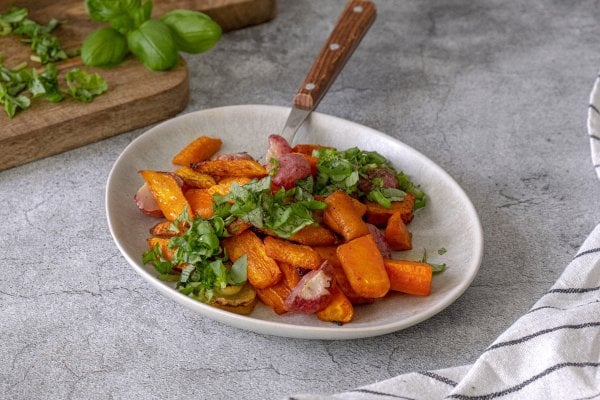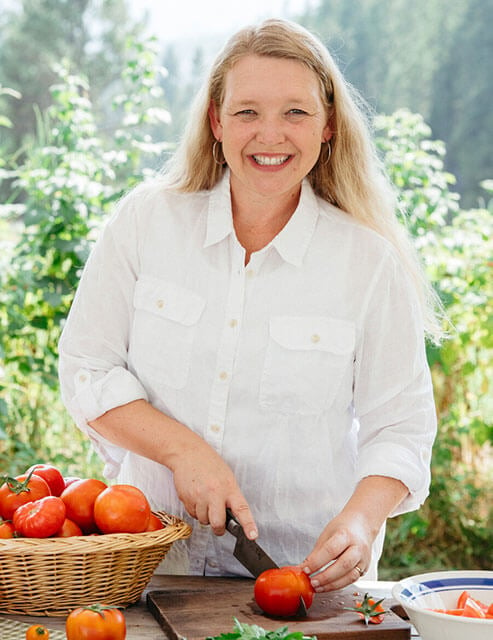This easy pickled egg recipe is a great healthy and high-protein snack to keep on hand. They’re easily stored in the refrigerator with no canning required. They’re the perfect on-the-go snack, are delicious sliced on top of a salad, and great layered on a sandwich. You could also make them into deviled eggs or even a tangy egg salad sandwich.

Why I Love Pickled Eggs
As a homesteader, I’m always on the lookout for practical and delicious ways to preserve our farm-fresh eggs. That’s where pickled eggs come in as one of the many preservation options. Not only are they a tangy treat, but they also offer a fantastic solution for extending the shelf life of our surplus of eggs.
In this blog post, I’ll share a few of the best pickled egg recipes, including sweet, spicy and beet-colored variations, as well as our favorite semi-spicy version that uses turmeric for a beautiful golden color.
If you often find yourself with a surplus of eggs, give these other egg preservation methods a try:
- Easy Homemade Egg Noodles Recipe
- Water-Glassed Eggs
- Freezing Eggs
- Freeze-Dried Eggs
- Homemade Eggnog Recipe
If you want even more methods for preserving your extra eggs, check out our Egg Preservation Class! Or grab this free guide on how to preserve eggs.
What Are Pickled Eggs?
Pickled eggs are a brilliant invention. Born out of the need to preserve eggs while also enhancing their flavor. The process involves immersing hard-boiled and peeled eggs in a flavorful pickling liquid, typically consisting of vinegar, spices, and other seasonings.
Over time, the eggs absorb these flavors, resulting in a fantastic tangy flavor and a longer shelf life.
Homemade Pickled Egg Recipe
For something that’s so versatile, this sweet, sour and salty recipe is extremely easy to make. I love that the flavoring options are virtually endless, meaning no matter what I’m craving, a delicious pickled egg will do!
I also love that you can make pickled eggs with all kinds of eggs. Unlike other preservation methods, you can use store-bought eggs, farm-fresh eggs, or even farm eggs you’ve had to wash after bringing them in from the coop.
This recipe can be stored in the refrigerator for many, many months. Check out the video tutorial to see how easy this pickled egg recipe is to make.

Making Easy-To-Peel Hard-Boiled Eggs
The perfect pickled eggs start off with the perfect hard-boiled eggs. I’ve tried all kinds of methods for hard-boiling eggs, and the very best tip I know is to let your farm-fresh eggs age on the counter for about a week before hard-boiling them.
If you’re using store-bought eggs, your eggs are probably old enough to boil straight from the grocery store (do not keep store-bought eggs on the counter as they’ve already been washed and will not keep at room temperature).
- Take a spoon and gently tap the top of each egg until you hear a “snap.” That snapping sound is the inner membrane breaking, which will make peeling the eggs once boiled much easier. Don’t tap too hard, you don’t want to crack your egg!
- Drop room-temperature eggs into rapidly boiling water.
- Boil chicken eggs for 12 minutes and duck eggs for 15 minutes.
- Remove them from the water and immediately run them under cold water to stop the cooking.
- Let the eggs cool before peeling, then continue on with the pickled egg recipe below.
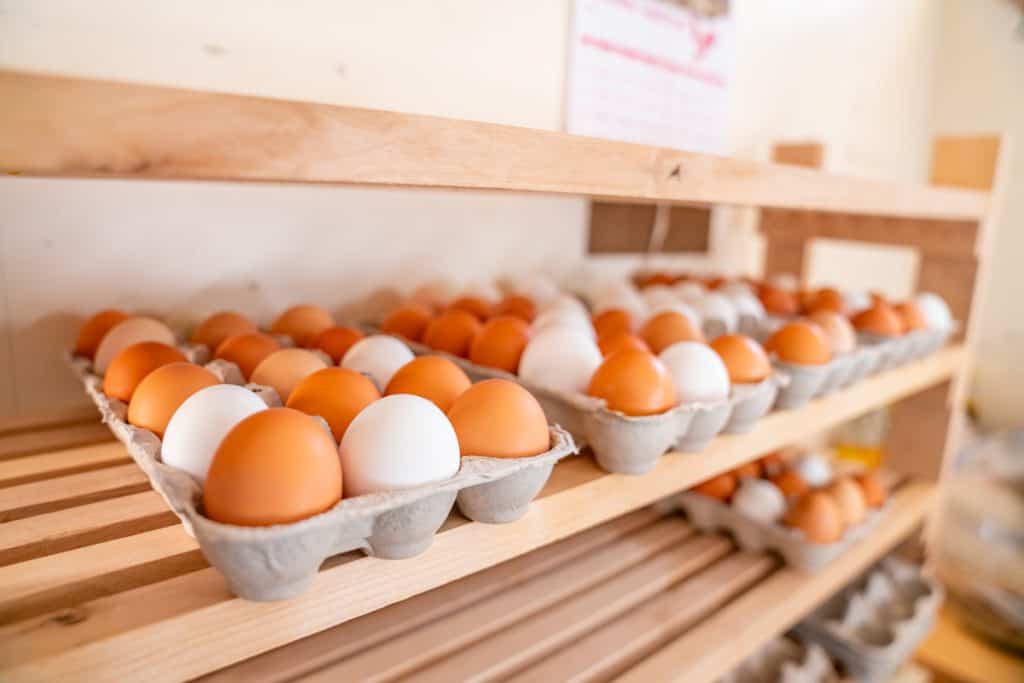
Pickled Egg Recipe
This is our family’s favorite version of pickled eggs. The turmeric gives the eggs a nice golden color that’s so pretty.
Base Brine Recipe
This is a basic brine recipe. You can choose your flavor variations below to make whatever pickled egg recipe sounds best to you.
Homesteading Hack: You can mix up this brine and keep it in the refrigerator until you’re ready for it. When I know I have a lot of eggs coming in I’ll make up a large batch to have on hand for a few batches here and there.
- Apple cider vinegar (or other vinegar) – We like the flavor combination of the tangy apple cider vinegar with the garlic, chili peppers and turmeric. But plain white vinegar will give you more of a classic pickling brine.
- Water – Always use filtered or non-chlorinated water when preserving.
- Salt – We love our Redmond Real Salt for all kitchen (and animal) purposes here on the homestead. Use code “HFSalt” for 15% off your purchase!

Spicy Turmeric Ingredients
- Garlic – Fresh whole cloves are great for this recipe.
- Red Chili Pepper – Increase or decrease the amount, depending on how spicy you like it!
- Tumeric – Adds a beautiful golden color.
- Other herbs and spices (optional) – If there’s a specific flavor profile you love with your pickled eggs, go ahead an add them! Some classics are dill, mustard seeds and peppercorns.
Instructions
- Start with eggs that have been hard-boiled and peeled. Homesteading Hack: Hard boil and peel your eggs ahead of time to make the day of pickling eggs super fast and stress-free.
- Grab a large pot, add your vinegar, water, and salt and bring to a boil. Allow the salt to dissolve completely and set aside until needed. This is your base brine recipe.
- While the brine is heating up, give your jars a nice good wash.
- Add garlic, chili pepper, and turmeric to the jar (or other flavoring options below).
- Top with about ½-1 cup of brine, then layer in your hard-boiled eggs. Try to pack them in nice and tight, but not so tight that the egg whites break or crack.
- Pour brine over the top of the eggs until they’re covered.
- Add a lid and store in the refrigerator.
The eggs are good to eat within 3-5 days, but I find they taste best after letting them sit for two weeks.

Pickled Egg Variations
Give these other pickled egg recipe variations a try, or mix and match your flavors until you find what your family loves best.
- Classic Sweet Pickled Eggs – For those who enjoy a touch of sweetness, the classic sweet pickled eggs are a timeless favorite. Add ¼ – ½ cup sugar to your brine and your favorite pickling spices to each jar before filling. Then, top each jar with a splash of beet juice (or add a few slices of fresh beets to each jar).
- Spicy Dill Pickled Eggs – If you prefer a zesty kick, try our spicy dill pickled eggs. Use white vinegar in the base brine recipe. To each jar add pickling spices, garlic, mustard seeds, fresh or dried dill and slices of red onions. To kick it up a notch, add some jalapeno slices.

Tips for Pickled Eggs
- Hard boil eggs that are at least a week old, this makes peeling them MUCH easier.
- Hard boil and peel your eggs ahead of time, this makes the day of pickling eggs super fast and stress-free.
- Avoid using cloves in your brine if you’d like a nice clear brine.
- Use regular white vinegar if you’d like a nice clear brine.
- You can substitute white vinegar or rice wine vinegar for a different flavor.
- Adding a few slices of red onions, beets or beet juice will make your eggs beautifully pink!
- Feel free to experiment with additional flavors like dill, onion, even jalapeno for some added spice.

Pickled Egg Serving Suggestions
Now that you’ve made this homemade pickled egg recipe, you may be wondering all the ways to enjoy them. Here are some serving suggestions:
- Serve as a tangy addition to your salads or sandwiches.
- Slice and top your egg salad with pickled eggs for an extra burst of flavor.
- Add a few pickled eggs to your cheese and charcuterie platter for a unique twist.
- Enjoy them straight out of the jar as a delightful, guilt-free snack.
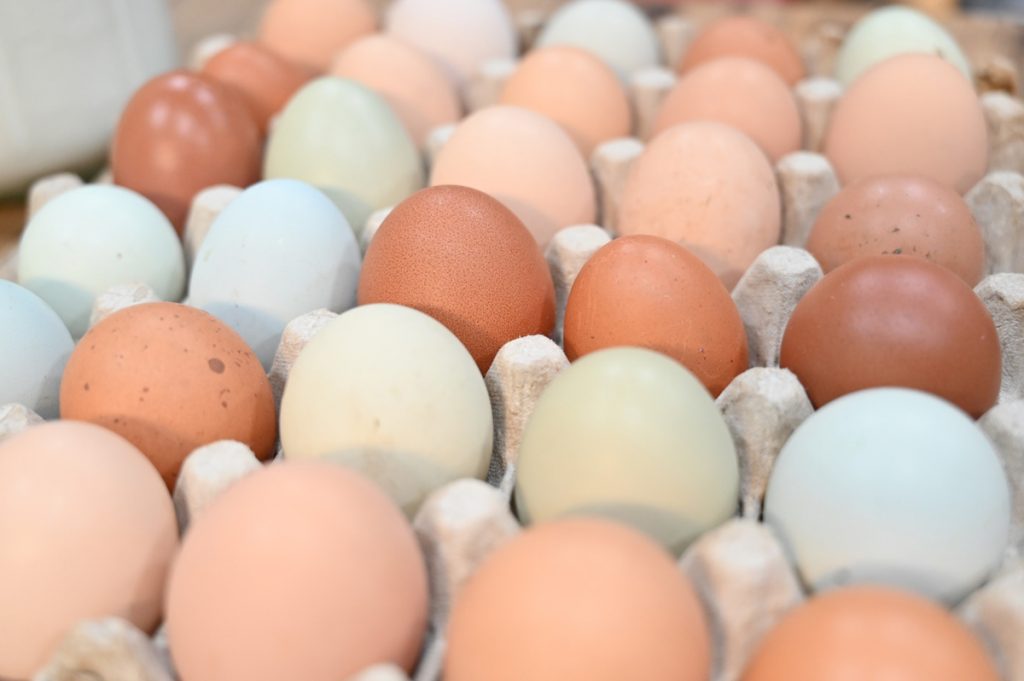
Frequently Asked Questions
Have some questions about pickled eggs? Here are answers to the most common ones:
- How long can I store pickled eggs? Pickled eggs can be stored in the refrigerator for up to 2-3 months, but they are best when consumed within the first month for optimal flavor.
- Can I reuse the pickling liquid? No, it’s not considered safe to reuse the pickling brine.
With these delicious pickled egg variations, helpful tips, and serving suggestions, you’ll be savoring your farm-fresh eggs in a whole new way. Enjoy your homemade pickled eggs and the extended shelf life they provide!

Homemade Pickled Egg Recipe
Equipment
- Instant Pot or stockpot to boil the eggs
- Saucepan
- Wooden spoon
- Glass Jars with Lids
Ingredients
- 16 Whole Eggs
- 4 cups Apple Cider Vinegar or white vinegar
- 1 cup Water filtered is best
- 1/2 cup Salt We use Redmond Real Salt. Use that link to automatically get 15% off your order!
- Seasonings Choose a flavor variations listed in the recipe notes.
Instructions
- I prefer to start with Instant Pot hard-boiled eggs, but if you don’t have an Instant Pot, you can simply drop room-temperature eggs into rapidly boiling water (12 minutes for chicken eggs and 15 for duck eggs). Remove the eggs from the water and immediately submerge them in an ice bath. Peel the eggs once they are completely cool.
- Make your brine by adding the vinegar, water, and salt to a saucepan. Bring to a boil, and allow the salt to dissolve completely. Set the brine aside until needed.
- Meanwhile, wash your jars well. Choose a flavor variation in the recipe notes below, and add the seasonings to the jars.
- Add ½-1 cup brine to eacj jar.
- Layer your eggs into the jar, packing them tightly, but not so tight that the whites break or crack.
- Pour remaining brine over the eggs until they’re covered completely.
- Add lid and refrigerate for 2 weeks.
- Enjoy as-is, or in all your favorite recipes.
Notes
- Classic Sweet Pickled Eggs – For those who enjoy a touch of sweetness, the classic sweet pickled eggs are a timeless favorite. Add ¼ – ½ cup sugar to your brine and your favorite pickling spices to each jar before filling. Then, top each jar with a splash of beet juice (or add a few slices of fresh beets to each jar).
- Spicy Dill Pickled Eggs – If you prefer a zesty kick, try our spicy dill pickled eggs. Use white vinegar in the base brine recipe. To each jar add pickling spices, garlic, mustard seeds, fresh or dried dill and slices of red onions. To kick it up a notch, add some jalapeno slices.
- Spicy Turmeric – This is my family’s favorite combination. Use whole garlic cloves, red chili pepper flakes, and about a teaspoon of turmeric.
- Other Herbs and Spices (Optional) – If there’s a specific flavor profile you love with your pickled eggs, go ahead and add them! Some classics are dill, mustard seeds and peppercorns.
- Hard-boil eggs that are at least a week old; this makes peeling them MUCH easier.
- Before boiling your eggs, take a spoon and gently tap the top of each egg until you hear a “snap.” That snapping sound is the inner membrane breaking, which will make peeling the eggs much easier once boiled. Don’t tap too hard; you don’t want to crack your egg!
- Hard-boil and peel your eggs ahead of time; this makes the day of pickling eggs super fast and stress-free.
- You can mix up this brine and keep it in the refrigerator until you’re ready for it. When I know I have a lot of eggs coming in, I’ll make up a large batch to have on hand for a few batches here and there.
- If you like a nice, clear brine, use white vinegar and avoid using cloves.
- You can substitute white vinegar or rice wine vinegar for a different flavor.
- Adding a few slices of red onions, beets, or beet juice will make your eggs beautifully pink!
- Feel free to experiment with additional flavors like dill, onion, or even jalapeno for some added spice.
- Enjoy your pickled eggs straight out of the jar, serve them on a charcuterie platter, or add them as a tangy addition to salads and sandwiches.











